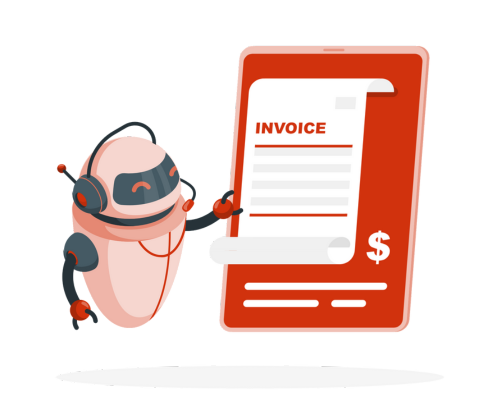One of the most important aspects of running a business is maintaining accurate records of your finances. This includes keeping track of invoices and ensuring that they are paid on time. Traditionally, this has been a manual process that is time-consuming and prone to human error. However, automating invoice processing with Robotic Process Automation (RPA) can have a number of benefits for your business. In this article, we will take a look at the top 10 benefits of automating invoice processing with RPA.
What is Invoice Processing?
Invoice processing is a family of methods that ensures all short-term debts get paid to the vendors on time or before to earn early payment discounts.
Invoice processing is a cycle of receiving an invoice from suppliers, complying with invoices against business standards, adding details in the ledger account, cross-checking for accuracy, sending for approval, and processing the payments.
This process cycle is iterative and counterproductive as it slows down the process and dulls your employees.
According to research done by Insider Intelligence, 44% of companies opt to integrate automation in their account payable processes. To know why? Keep reading…
Top 10 benefits of invoice automation
Invoice automation has many benefits. Automating invoice processing with RPA depreciates cost, reduces fraud, ameliorates efficiency, and ensures an audit trail.
Below is a list of 10 benefits of automating invoice processing:
Time-Saving:
According to surveys, automating invoice processing curtails invoice processing time. Invoice automation is time-saving by abridging three steps simultaneously (data extraction, data entry automation, and data validation). Manual processing consumes days and weeks, whereas automated invoice processing will complete it in scant hours.
Cost-saving:
According to the reports, a small company spends an average of $15 on a single invoice. Further, the report states that expenses for a single invoice in mega-companies can reach as much as $40. Based on these data, the annual cost of invoice processing for small enterprises for 30,000 invoices is $450,000. For mega-companies, the price for 30,000 invoices per year at $40 per invoice is $1,200,000.
Through invoice automation, the cost drops to $1 per invoice. These considerable savings on invoice processing will help businesses be more profitable.
Eliminating human error:
Believe it or not, manual invoice processing is prone to human error. Although human employees try not to make any errors, the mundaneness of the work makes the human brain dull, creating a high possibility of error.
However, software bots, like virtual employees, can work 24/7 and 365 days without becoming tired or asking for leave. Invoice automation saves your employees from performing redundant tasks and enables them to focus more on cognitive and creative work. By eliminating human error, the accuracy level in invoice processing increases by 95%.
Increased security:
Invoice automation disables any possibility of a bad actor forging documents. Not all employees are loyal. Some with a twisted mind can play the role of a sinister actor and counterfeit the signatures of an authoritative person to manipulate profit.
Conversely, the virtual employee remains loyal. It does not demand profitability, but performs all the tasks as a faithful employee.
Improved buyer and supplier relations:
The other significant benefit of invoice automation is that it helps you to bid for early payment discounts. In manual invoice processing, the time taken to complete the process is so huge that buyers lose the opportunity to avail discounts. But not in the case of invoice automation. With invoice automation, not only can you bid for early payment discounts, but it will also build healthy relationships between buyers and suppliers. With suppliers getting paid on time, you become their delightful client, with whom they want to continue doing business.
Audit trail and governance:
Invoice automation brings clarity and visibility to documents. It enables easy tracking of records and documents to cross-check for any duplication or discrepancy. With invoice automation, authorities have easy access to governing the process without getting lost in piles of files and documents.
Easy customisation:
Automating invoice processing with RPA is easy to get accustomed to, as per your business requirements. With the flexibility of the automation technology, you can customise the route and flowchart of the process. Invoice automation also lets you choose who will have access to payable accounts.
Quick ROI:
By saving a large sum of money from manual processing, the business becomes more profitable. Invoice automation enables the human workforce to work out creative juices and intelligence and engage in value-driven activities. Cost-saving in many different areas qualifies the business for quick ROI realisation in less than six months.
Compliance management:
Invoice automation ensures that business processes comply with business terms and conditions. Tracking, auditing, and matching invoices become easier with automated invoice processing.
Enables remote working:
Lastly, invoice automation makes remote working healthy and accountable. The COVID-19 pandemic forced companies and businesses to opt for work-from-home arrangements. Businesses heavily burdened with manual processing and paperwork faced disruptions. The other setback faced by companies with hybrid working arrangements was idle employees.
With remote and hybrid work becoming the norm, automation can help you track your employees’ performance and productivity. Integrating automation into business processes is the future of work.
Apart from these top 10 benefits of invoice automation, other advantages include improved employee morale, data recovery in case of disaster, tax compliance, and many more.
You bring your problems to the table; we bring our RPA solutions
As stated at the beginning of the article, the only way you can cope with these changes is by integrating automation technologies in your business processes.
If automation, RPA, AI, and ML are new terminologies to you. Or, you felt the nudge to employ automation in your business processes, but are unaware of where it can be integrated. Fill out the book consultation form below 👇 and consult with our experts.
You bring your problems to the table, and our consultant team at RPATech will bring RPA solutions. CONTACT US NOW!




